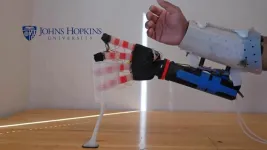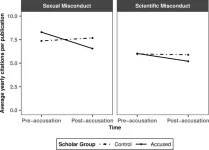(Press-News.org) At the height of the COVID-19 pandemic, hospitals frequently ran short of beds in intensive care units. But even earlier, ICUs faced challenges in keeping beds available. With an aging American population, 11% of hospital stays included ICU stays.
Artificial intelligence offers a possible solution, says Indranil Bardhan, professor of information, risk, and operations management and Charles and Elizabeth Prothro Regents Chair in Health Care Management at Texas McCombs. AI models can predict the lengths of time patients will spend in the ICU, helping hospitals better manage their beds and, ideally, cut costs.
But although AI is good at predicting length of stay, it’s not so good at describing the reasons, Bardhan says. That makes doctors less likely to trust and adopt it.
“People were mostly focused on the accuracy of prediction, and that’s an important thing,” he says. “The prediction is good, but can you explain your prediction?”
Explaining AI Results
In new research, Bardhan makes AI’s outputs more understandable and useful to ICU doctors, an approach called explainable artificial intelligence (XAI).
With McCombs doctoral student Tianjian Guo, Ying Ding of UT’s School of Information, and Shichang Zhang of Harvard University, Bardhan designed a model and trained it on a dataset of 22,243 medical records from 2001 to 2012.
The model processes 47 different attributes of patients at the time they’re admitted, including age, gender, vital signs, medications, and diagnosis. It constructs graphs that show a patient’s probability of being discharged within seven days. The graphs also depict which attributes most influence the outcome and how they interact.
In one example, the model calculates an 8.5% likelihood of discharge within seven days. It points to a respiratory system diagnosis as the main reason, and to age and medications as secondary factors.
Running their model against other XAI models, the researchers found its predictions were just as accurate, while its explanations were more comprehensive.
Useful Beyond ICUs
To test how useful their model might be in practice, the team surveyed six physicians at Austin-area ICUs, asking them to read and evaluate samples of the model’s explanations. Four of the six said the model could improve their staffing and resource management, helping them better plan patient scheduling.
The model has one major limitation, Bardhan notes: the age of the data. In 2014, the industry’s medical coding system changed from ICD-9-CM to ICD-10-CM, adding much more detail in diagnosis coding and classification.
“If we were able to get access to more recent data, we would have loved to extend our models using that data,” he says.
His model need not be limited, however, to adult ICUs. “You could extend it to pediatric ICUs and neonatal ICUs,” Bardhan says. “You could use this model for emergency room settings.
“Even if you’re talking about a regular hospital unit, if you want to know how much or how long a patient is likely to need a hospital bed, we can easily extend our model to that setting.”
“An Explainable AI Approach Using Graph Learning to Predict ICU Length of Stay” is published in Information Systems Research.
Story by Omar Gallaga
END
AI can open up beds in the ICU
By explaining factors that affect a patient’s length of stay, artificial intelligence can help hospitals improve scheduling for staff and patients
2025-03-05
ELSE PRESS RELEASES FROM THIS DATE:
Are robotic hernia repairs still in the “learning curve” phase?
2025-03-05
For an abdominal wall hernia repair, also known as a ventral hernia repair, the most common surgical approaches have been laparoscopic and open techniques.
But a new approach for repairing hernias has been steadily growing in popularity: the surgical robot.
Supporters of using the robot method state multiple advantages over traditional laparoscopic and open approaches, including improved surgeon ergonomics.
But there may be downsides to the technology that are going undiscussed.
In a research article published in JAMA Surgery, Brian Fry, M.D., M.S., a ...
New STI impacts 1 in 3 women: Landmark study reveals men are the missing link
2025-03-05
A landmark study reveals that bacterial vaginosis (BV), a condition affecting nearly a third of women worldwide and causing infertility, premature births and newborn deaths, is in fact a sexually transmitted infection (STI), paving the way for a revolution in how it is treated.
Monash University and Alfred Health researchers at the Melbourne Sexual Health Centre say their findings, published today in the New England Journal of Medicine, hold the key to driving down stubborn and distressing recurrence ...
Feeling is believing: Bionic hand “knows” what it’s touching, grasps like a human
2025-03-05
Johns Hopkins University engineers have developed a pioneering prosthetic hand that can grip plush toys, water bottles, and other everyday objects like a human, carefully conforming and adjusting its grasp to avoid damaging or mishandling whatever it holds.
The system’s hybrid design is a first for robotic hands, which have typically been too rigid or too soft to replicate a human’s touch when handling objects of varying textures and materials. The innovation offers a promising solution for people with hand loss and could improve how robotic arms interact with their environment.
Details about the device appear today in Science Advances.
“The ...
Damon Runyon Cancer Research Foundation awards $4.4 million to top young scientists
2025-03-05
The Damon Runyon Cancer Research Foundation has named 13 new Damon Runyon Fellows, exceptional postdoctoral scientists conducting basic and translational cancer research in the laboratories of leading senior investigators. The prestigious, four-year Fellowship encourages the nation's most promising young scientists to pursue careers in cancer research by providing them with independent funding ($300,000 total) to investigate cancer causes, mechanisms, therapies, and prevention.
The Foundation has also named ...
Over-the-counter pain relievers linked to improved recovery from concussion
2025-03-05
EMBARGOED FOR RELEASE UNTIL 4 P.M. ET, WEDNESDAY, MARCH 5, 2025
Media Contacts:
Renee Tessman, rtessman@aan.com, (612) 928-6137
Natalie Conrad, nconrad@aan.com, (612) 928-6164
Over-the-counter pain relievers linked to improved recovery from concussion
MINNEAPOLIS – People who take over-the-counter pain relievers after a concussion may recover faster than those who do not take pain relievers, according to a preliminary study released today, March 5, 2025, that will be presented at the American Academy of Neurology’s 77th Annual Meeting taking place April 5–9, 2025, in San Diego ...
Stressed out? It may increase the risk of stroke
2025-03-05
MINNEAPOLIS — Some people living with chronic stress have a higher risk of stroke, according to a study published on March 5, 2025, online in Neurology®, the medical journal of the American Academy of Neurology. The study looked at younger adults and found an association between stress and stroke, with no known cause, in female participants, but not male participants. This study does not prove that stress causes stroke; it only shows an association.
“Younger people often experience stress due to the demands and pressures associated with work, including long hours and job insecurity, as well as financial burdens,” ...
Nanoscale tweaks help alloy withstand high-speed impacts
2025-03-05
ITHACA, N.Y. – A Cornell University-led collaboration devised a new method for designing metals and alloys that can withstand extreme impacts, which could lead to the development of automobiles, aircraft and armor that can better endure high-speed impacts, extreme heat and stress.
The research, published in Communications Materials, introduces nanometer-scale speed bumps that suppress a fundamental transition that controls how metallic materials deform.
The project was led by Mostafa Hassani, assistant professor of mechanical ...
AI-generated voices which sound like you are perceived as more trustworthy and likeable, with implications for deep-fakes and manipulation
2025-03-05
AI-generated voices which sound like you are perceived as more trustworthy and likeable, with implications for deep-fakes and manipulation
Article URL: https://plos.io/4baFCW5
Article title: AI-determined similarity increases likability and trustworthiness of human voices
Author countries: Germany
Funding: The author(s) received no specific funding for this work. END ...
The cacao tree species (Theobroma cacao L.), from which we get chocolate, is likely about 7.5 million years old, with chloroplast genomes indicating that the current known diversity diversified during
2025-03-05
The cacao tree species (Theobroma cacao L.), from which we get chocolate, is likely about 7.5 million years old, with chloroplast genomes indicating that the current known diversity diversified during the Pliocene or Miocene epochs
Article URL: https://plos.io/4gQHlB2
Article title: Comparative analyses of chloroplast genomes of Theobroma cacao from northern Peru
Author countries: Perú
Funding: This study was supported by the Programa Nacional de Investigación Científica y Estudios Avanzados (PROCIENCIA) funded by the Project through the Contract N° 026-2016-FONDECYT “Círculo de Investigación ...
After sexual misconduct accusations, scholars’ work is cited less
2025-03-05
In a new analysis, scholars publicly accused of sexual misconduct experienced a significant decrease in the rate at which other scholars cited their published research. Giulia Maimone of the University of California, Los Angeles, U.S., and colleagues present these findings in the open-access journal PLOS One on March 5, 2025.
In academia, scholars cite other scholars’ publications as a widely agreed-upon way to reference existing research and promote scientific advancement. A scholar with a high number of citations may be considered particularly impactful in their field. Prior research ...
LAST 30 PRESS RELEASES:
Yale study challenges notion that aging means decline, finds many older adults improve over time
Korean researchers enable early detection of brain disorders with a single drop of saliva!
Swipe right, but safer
Duke-NUS scientists identify more effective way to detect poultry viruses in live markets
Low-intensity treadmill exercise preconditioning mitigates post-stroke injury in mouse models
How moss helped solve a grave-robbing mystery
How much sleep do teens get? Six-seven hours.
Patients regain weight rapidly after stopping weight loss drugs – but still keep off a quarter of weight lost
GLP-1 diabetes drugs linked to reduced risk of addiction and substance-related death
Councils face industry legal threats for campaigns warning against wood burning stoves
GLP-1 medications get at the heart of addiction: study
Global trauma study highlights shared learning as interest in whole blood resurges
Almost a third of Gen Z men agree a wife should obey her husband
Trapping light on thermal photodetectors shatters speed records
New review highlights the future of tubular solid oxide fuel cells for clean energy systems
Pig farm ammonia pollution may indirectly accelerate climate warming, new study finds
Modified biochar helps compost retain nitrogen and build richer soil organic matter
First gene regulation clinical trials for epilepsy show promising results
Life-changing drug identified for children with rare epilepsy
Husker researchers collaborate to explore fear of spiders
Mayo Clinic researchers discover hidden brain map that may improve epilepsy care
NYCST announces Round 2 Awards for space technology projects
How the Dobbs decision and abortion restrictions changed where medical students apply to residency programs
Microwave frying can help lower oil content for healthier French fries
In MS, wearable sensors may help identify people at risk of worsening disability
Study: Football associated with nearly one in five brain injuries in youth sports
Machine-learning immune-system analysis study may hold clues to personalized medicine
A promising potential therapeutic strategy for Rett syndrome
How time changes impact public sentiment in the U.S.
Analysis of charred food in pot reveals that prehistoric Europeans had surprisingly complex cuisines
[Press-News.org] AI can open up beds in the ICUBy explaining factors that affect a patient’s length of stay, artificial intelligence can help hospitals improve scheduling for staff and patients



